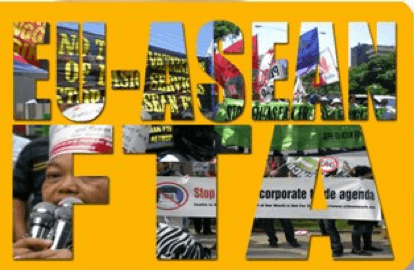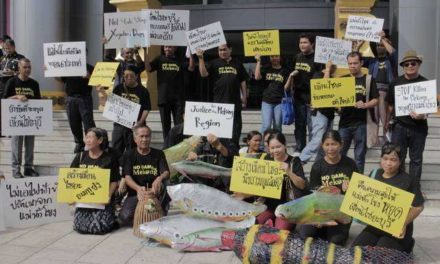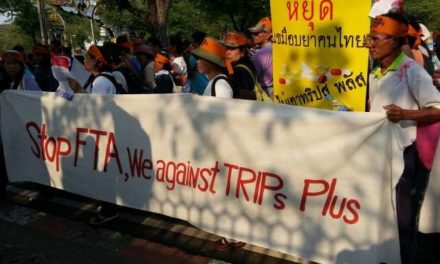EU-ASEAN FTA Campaign Network-Philippines
6 March 2013
In the wake of recent pronouncements from the Philippine government of its proposal to begin bilateral free trade negotiations with the European Union this month, the EU-ASEAN FTA network expresses its serious concern that the proposed agreement would be too ambitious for the Philippines, erode people’s rights and undermine development.
We note at least two areas where the level of ambition that the EU is expected to push in the talks would go well beyond current Philippine commitments under the WTO and its other bilateral and regional free trade agreements.
We are concerned that the negotiations for an EU-Philippines FTA would include provisions on intellectual property rights that are beyond current WTO commitments on Trade-Related Intellectual Property Rights (TRIPS Plus); that would effectively undermine our Cheaper Medicines Law; and would ran counter to government’s own goal of ensuring the right to health and access to medicines. Furthermore, the recent amendments to the Philippine IP Code on technological protection measures as well as rights management information have already given away Philippine negotiating positions on these issues without the Philippines getting any solid trade concessions from the EU, even before the negotiations has even started
Similar warnings have come from the United Nations Development Program (UNDP) and the UNAIDS program, which have come out strongly against these TRIPS plus provisions in FTAs and their impact on public health. The report concludes “to retain the benefits of TRIPS Agreement flexibilities, countries, at minimum should avoid entering into FTAs that contain TRIPS-plus obligations that can impact on pharmaceuticals price or availability.”
We are also concerned over the investment chapter in FTAs being pushed by the EU which would afford greater protection and rights for corporations including the right to sue governments over certain policies and regulations. We are deeply concerned over the agenda of the EU to include investor to state dispute mechanism as an integral part of the investment chapter in its FTAs with ASEAN countries.
There are currently two pending investment arbitration cases under the International Centre for the Settlement of Investment Disputes (ICSID) that pit the interests of the Philippines versus those of European corporations. Aside from the million dollar claims of corporations, litigating these cases already constitute a big burden on tax payer’s money.
In the case of Fraport AG Frankfurt Airport Services Worldwide versus Republic of the Philippines (ICSID Case No. ARB/03/25) for instance, which the court ruled in favor of the Philippines on account of lack of jurisdiction, the arbitration cost to the Philippines was around US$50 million in legal fees alone, financial resources that could otherwise have been used to support more pressing needs like disaster relief and rehabilitation or public education and health programmes.
On the aspect of trade in goods, recent press reports based on a study on the fisheries agenda by PIDS, have identified the tuna sector as a potential winner in these talks. What is clear however and what has not been reported in the media is that the same study pointed to a negative impact on small fishers as the drive to increase tuna exports to the EU could exacerbate the degradation of our resource base.
Furthermore, there are existing government studies indicating the potential adverse impacts of resource depletion of Philippine tuna fisheries in case of increased tuna exports as a result of the trade agreement but there were no clear measures studied how these adverse impacts can be avoided; should the Philippines enter into the negotiations, the Philippines should have in place these fisheries resource rehabilitation measures in place up and running before anything else.
On the negotiations process, the DTI has launched a One Country, One Voice mechanism to facilitate the consolidation of a national framework for the EU-Philippine FTA talks. The recent pronouncements from the government however reflect only one view and that is the voice of Philippine exporters to the EU. It has ignored the demands from civil society for example for impact assessments particularly on the sensitive issue of IPR and access to medicines and full disclosure of the Philippine negotiating framework for the talks.
We urge the Philippine government to heed the warnings from civil society organizations on the perils of an ambitious EU-Philippines FTA; to disclose fully its negotiating agenda, and engender a more participatory process that would guarantee that people’s rights and welfare are protected.
We reiterate our call to the government to develop a coherent trade and industrial policy that balances economic development goals with social and environmental concerns #
Contact person: Joseph Purugganan, Coordinator, EU-ASEAN FTA Campaign Network. 19 Maginhawa St. UP Village, DIliman Quezon City. Tel. No. 4331676; mobile: +639228299450 Email: [email protected]









